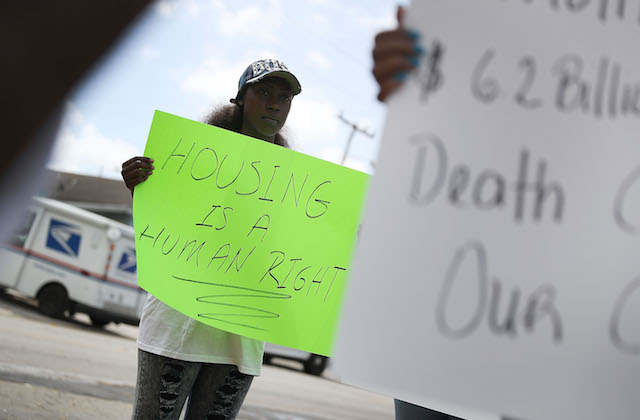REPORT: Ben Carson's Plan to Raise Rent Hurts Poor Families of Color

Housing Secretary Ben Carson says he wants to raise rents for people who receive federal housing subsidies by roughly 20 percent to push them into finding work. But a new analysis released today (June 7) by nonpartisan research institute Center on Budget and Policy Priorities says Carson's plan would push millions of people into homelessness.
The Department of Housing and Urban Development's rent overhaul would affect nearly four million people—most of whom are already employed—in 100 metropolitan areas across the country, as The Associated Press reports. Rent increases would range from $510 to $980 a year and are six times greater than the growth in average hourly wages. For the country's poorest workers, these changes would place them at high risk for eviction and homelessness, as they would be unable to afford exorbitant housing expenses.
On April 25, Carson unveiled a legislative proposal to amend the United States Housing Act of 1937 to include changes such as requiring people who receive housing subsidies to work. The proposal, which still awaits Congressional approval, is part of the Trump administration's move to erode government safety net programs by cutting federal funding and placing work requirements on people who rely on public assistance, including food stamps and Medicaid.
"This proposal to raise rents on low-income people doesn't magically create well-paying jobs needed to lift people out of poverty," Diane Yentel, CEO of the National Low Income Housing Coalition told The AP. "Instead it just makes it harder for struggling families to get ahead by potentially cutting them off from the very stability that makes it possible for them to find and keep jobs."
The proposed "Make Affordable Housing Work Act of 2018" would raise the minimum rent from $50 to $150 and require workers to contribute between 30 and 35 percent of their income to rent. It would also eliminate deductions for childcare and medical expenses and each child living in a household.
Carson's proposal builds upon historically discriminatory attacks against Black and Latinx people who rely on federal subsidies. If passed, the proposal would create dire consequences for the nation's most vulnerable groups. As Colorlines previously reported, Black and Latinx people are twice as likely to rent their homes as opposed to White people. Women of color living in poverty are already at high risk for eviction, according to a recent study by The Eviction Lab, and Black women are evicted at alarmingly higher rates than any other group.
View state-level data on how the proposed legislation could impact people living in poverty here.
